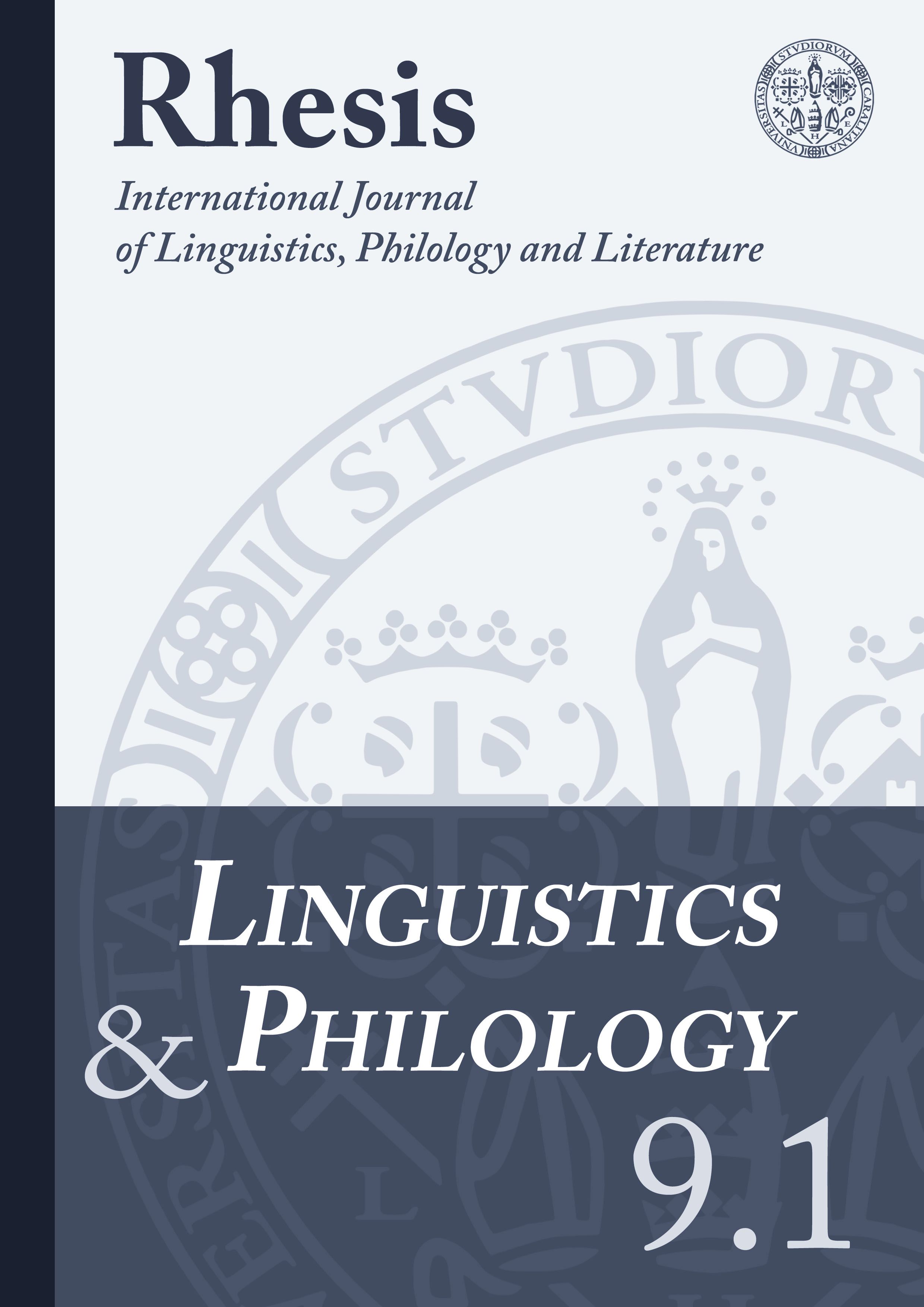Il Sardo a Orgosolo: variazioni d’uso e competenze
Abstract
Orgosolo is a village located in the central Sardinia where the Sardinian language is still handed down from a generation to another and widely employed both in informal and formal conversations. Nevertheless, the linguistic contacts with other local varieties and, above all, with Italian determine frequent variations at phonetic, morphologic, morphosyntactic and lexical level, impacting on each speaker competences. In this study, following a description of the contexts in which Sardinian and Italian are used, the most frequent phonetic, morphologic and lexical variations – pertaining both standard and less traditional vocabulary – will be analysed together with the impact of Italian language on speaker knowledges and competences, taking into consideration the most important sociolinguistic variables, in particular age, gender, education and profession.
Downloads
References
BERRUTO, Gaetano (2005), “Dialect/standard convergence, mixing, and models of language contact: the case of Italyˮ, in Peter AUER, Franz HINSKENS and Paul KERSWILL (eds.), Dialect change. Convergence and divergence in European languages. Cambridge: Cambridge University Press, 81-96.
BOKAMBA, Eyamba G. (1988), “Code-mixing, language variation and linguistic theory: evidence from Bantu languagesˮ, in «Lingua» 76, 21-62.
DAL NEGRO, Silvia (2005), “Il code switching in contesti minoritari soggetti a regressione linguisticaˮ, in «Italian Journal of Linguistics» 17, 157-178.
ECKERT, Penelope (2012), “Three Waves of Variation Study: The emergence of meaning in the study of variationˮ, in «Annual Review of Anthropology» 41, 87-100.
FASOLD, Ralph W. (1972), Tense Marking in Black English: A Linguistic and Social Analysis. Arlington, VA: Center for Applied Linguistics.
FEAGIN, Crawford (1979), Variation and Change in Alabama English: A Sociolinguistic Study of the White Community. Washington, DC: Georgetown University Press.
GORDON, Matthew J. (2005), “Research Aims and Methodology / Forschungsziele und Methodologieˮ, in Ulrich AMMON, Norbert DITTMAR, Klaus J. MATTHEIER, and Peter TRUDGILL (eds.), An International Handbook of the Science of Language and Society / Ein internationales Handbuch zur Wissenschaft von Sprache und Gesellschaft. Berlin-New York: De Grutyer, 955-964.
HAERI, Niloofar (1997), The Sociolinguistic Market of Cairo: Gender, Class and Education. London-New York: Kegan Paul International.
HALMARI, Helena (1997), Government and codeswitching. Explaining American Finnish. Amsterdam - Philadelphia: Benjamins.
JONES, Michael A. (2003), Sintassi della lingua sarda: Sardinian Syntax. Cagliari: Condaghes.
LABOV, William (1966), The Social Stratification of English in New York City. Washington, DC: Center for Applied Linguistics.
LAVINIO, Cristina and Gabriella LANERO (eds.) (2008), Dimmi come parli... Indagine sugli usi linguistici giovanili in Sardegna. Cagliari: Cuec Editrice.
LEDGEWAY, Adam (1997-1999), “I tempi sovracomposti nel napoletano anticoˮ, in «LʼItalia dialettale» 60, 105-124.
MACSWAN, Jeff (1999), A minimalist approach to intrasentential code switching. New York: Garland.
MYERS-SCOTTON, Carol (1993 [1997]), Duelling languages. Grammatical structure in codeswitching. Oxford: Clarendon Press.
MYERS-SCOTTON, Carol (2002), Contact linguistics. Bilingual encounters and grammatical outcomes. Oxford: Oxford University Press.
PISANO, Simone (2005-2006), “Esiti dellʼapprossimante palatale nella varietà di Orune (Nuoro), differenziazione fonetica su base sessualeˮ, in «LʼItalia dialettale» 68, 99-143.
PISANO, Simone (2009), “Lʼutilizzo dei tempi sovracomposti in alcune varietà sarde moderneˮ, in «Lingua e Stile» 45, 125-133.
PITTAU, Massimo (1972), La grammatica del sardo-nuorese. Bologna: Pàtron.
POPLACK, Shana, Susan WHEELER and Anneli WESTWOOD (1989), “Distinguishing language contact phenomena: evidence from Finnisch-English bilingualismˮ, in Kenneth HYLTENSTAM and Loraine K. OBLER (eds.), Bilingualism across the lifespan: aspects of acquisition, maturity and loss. Cambridge: Cambridge University Press, 132-154.
PUDDU, Mario (2015), Ditzionàriu de sa limba e de sa cultura sarda. Cagliari: Condaghes.
SHUY, Roger, W., Walt A. WOLFRAM and William K. RILEY (1968), Field Techniques in an Urban Language Study. Washington, DC: Center for Applied Linguistics.
STANFORD, James N. (2013), “How to Uncover Social Variables. A Focus on Clansˮ, in Christine MALLINSON, Becky CHILDS and Gerard VAN HERK (eds.), Data Collection in Sociolinguistics. Methods and Applications. New York: Routledge, 25-28.
TAGLIAMONTE, Sali A. (2006), Analysing sociolinguistic variation. New York: Cambridge University Press.
TRUDGILL, Peter (1974), The Social Differentiation of English in Norwich. Cambridge: Cambridge University Press.
VIRDIS, Maurizio (1988), “Sardisch: Arealinguistikˮ, in Günter HOLTUS, Christian SCHMITT, und Michael METZELTIN (Hrsg.), Lexikon der Romanistischen Linguistik (Vol. IV: Italienisch, Korsisch, Sardisch). Tübingen: Niemeyer, 897-913.
VIRDIS, Maurizio (2015), “Le proposizioni infinitive in Sardoˮ, in M. Grazia BUSÀ and Sara GESUATO (eds.), Lingue e contesti. Studi in onore di Alberto Mioni. Padova: CLUEP, 465-478.
WAGNER, Max L. (1938), “Flessione nominale e verbale del sardo antico e modernoˮ, in «LʼItalia Dialettale» 14, 93-170.
WAGNER, Max L. (1939), “Flessione nominale e verbale del sardo antico e modernoˮ, in «LʼItalia Dialettale» 15, 1-29.
WEINREICH, Uriel (1968), Languages in Contact. Findings and Problems. The Hague: Mouton.
WOLFRAM, Walt A. (1969), A Sociolinguistic Description of Detroit Negro Speech. Washington, DC: Center for Applied Linguistics.



